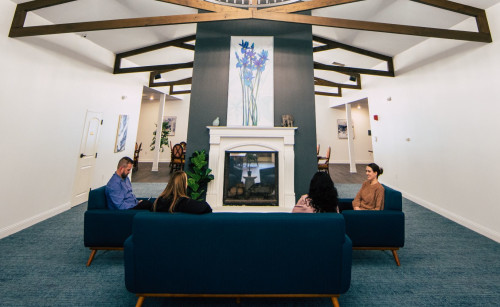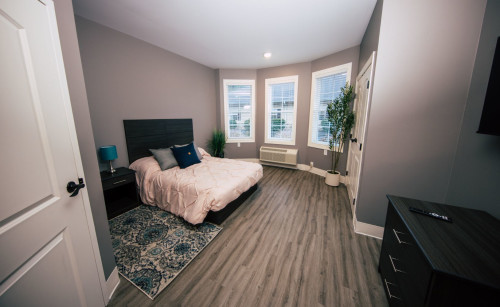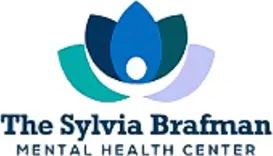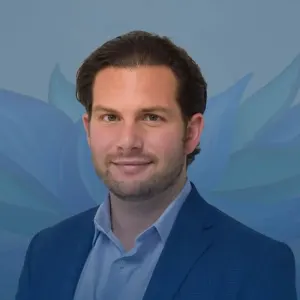








The Sylvia Brafman Mental Health Center Georgia
Verified Center
This provider's information has been quality-checked by Recovery.com's Research Team for accuracy and completeness, including center verification through appropriate third-party organizations.
Treatment Focus
This center treats mental health conditions and co-occurring substance use. You receive collaborative, individualized treatment that addresses both issues for whole-person healing.
Primary Level of Care
Offering intensive care with 24/7 monitoring, residential treatment is typically 30 days and can cover multiple levels of care. Length can range from 14 to 90 days typically.
Treatment Focus
This center treats mental health conditions and co-occurring substance use. You receive collaborative, individualized treatment that addresses both issues for whole-person healing.
Primary Level of Care
Offering intensive care with 24/7 monitoring, residential treatment is typically 30 days and can cover multiple levels of care. Length can range from 14 to 90 days typically.
Provider's Policy
The Sylvia Brafman Mental Health Center Georgia works with all major private medical insurance networks. If you don’t have medical insurance coverage or elect not to use it, we have reasonable self-pay rates and options worth exploring. We regret that we cannot work with state or federal (Medicaid or Medicare) insurance for mental health treatment at SBMHC.
The Sylvia Brafman Mental Health Center Georgia
The Sylvia Brafman Mental Health Center Georgia
About The Sylvia Brafman Mental Health Center Georgia
The Sylvia Brafman Mental Health Center, located in Georgia, is a residential treatment facility specializing in mental health and dual-diagnosis care. Founded by visionary leaders in the behavioral health industry, the center offers an all-encompassing approach where cutting-edge clinical expertise meets genuine human understanding. They specialize in treating a spectrum of mental health disorders, from the depths of depression and anxiety to the complexities of bipolar disorder and PTSD.
Maximize Chances for Recovery
Offering a blend of intensive clinical care and comfort, The Sylvia Brafman Center is set apart from traditional mental health hospitals. In their luxurious yet homey inpatient setting, clients receive comprehensive clinical, medical, and psychiatric treatment while enjoying private bedrooms with en-suite bathrooms and home-cooked meals. This comfortable environment supports mental health stabilization, allowing clients to feel at ease as they begin their healing journey. The center's approach is highly personalized, featuring small, intimate therapy groups and individualized treatment plans that typically span 30-90 days, depending on the needs of each person. The center focuses on accurate diagnosis, social therapeutic services, and strongly emphasizes family systems throughout the treatment process. This multifaceted strategy, combined with the center's exceptional clinical and medical backbone, offers an alternative to hospitalization, addressing mental wellness from various angles to support long-term recovery.
Unlock Personalized Healing with Innovative Treatment Options
The Sylvia Brafman Mental Health Center offers innovative programs and holistic therapies that go beyond conventional treatment norms. Their unique career launch program, led by co-founder Jaime Blaustein, helps patients navigate their career and educational paths forward. The center provides an array of wellness services, including genetic testing, nutrition counseling, yoga, reiki, and physical fitness. Evidence-based therapies like cognitive behavioral therapy (CBT), acceptance and commitment therapy (ACT), and eye movement desensitization and reprocessing (EMDR) are complemented by holistic approaches to create a well-rounded treatment experience. To make their world-class treatment accessible, the center accepts insurance with out-of-network benefits and offers private pay options. Grounded in empathy, genuine care, and clinical excellence, The Sylvia Brafman Mental Health Center provides a supportive healing environment for those seeking recovery.

Highlights from the Center
Highlights
These highlights are provided by and paid for by the center.
1-on-1 Counseling
Perfect for Professionals
Trauma-Informed Care
Private Rooms Only
Center Overview
Treatment Focus
This center treats mental health conditions and co-occurring substance use. You receive collaborative, individualized treatment that addresses both issues for whole-person healing.
Recently helped 9 people via Recovery.com

The Sylvia Brafman Mental Health Center Georgia
Recently helped 9 people via Recovery.com
Insurance Accepted
Cash Pay Rates
Estimated Cash Pay Rate
Center pricing can vary based on program and length of stay. Contact the center for more information. Recovery.com strives for price transparency so you can make an informed decision.




The Sylvia Brafman Mental Health Centers
Recovery.com Verified Listing
Recovery.com verified that the name, location, contact information and license to operate for this treatment provider are valid and up-to-date.

Licensed by Georgia
Recovery.com is an independent, third-party mental health resource. Verification does not imply endorsement and does not guarantee the quality of treatment services.
Meet Your Care Team

Ben Brafman
Co-Founder, Chief Clinical Officer
MS, LMHC

Richard Seely
Director of Psychiatry

Linda Dolin
Medical Director
MD

Michael Malamed
Spiritual Ambassador
TTA

Jaime Blaustein
Co-Founder, CEO
Your Care Options
Specializations
Intensive Inpatient
The highest level of care, medically managed intensive inpatient services provides 24-hour nursing and physician care.
Anxiety
Anxiety is a common mental health condition that can include excessive worry, panic attacks, physical tension, and increased blood pressure.
Bipolar
This mental health condition is characterized by extreme mood swings between depression, mania, and remission.
Co-Occurring Disorders
A person with multiple mental health diagnoses, such as addiction and depression, has co-occurring disorders also called dual diagnosis.
Depression
Symptoms of depression may include fatigue, a sense of numbness, and loss of interest in activities. This condition can range from mild to severe.
Executives
Executive treatment programs typically directly support the needs of people who manage businesses and may provide flexible schedules and office space to allow work during treatment.
Trauma
Some traumatic events are so disturbing that they cause long-term mental health problems. Those ongoing issues can also be referred to as "trauma."
Who We Treat
Older Adults
Addiction and mental health treatment caters to adults 55+ and the age-specific challenges that can come with recovery, wellness, and overall happiness.
Executives
Executive treatment programs typically directly support the needs of people who manage businesses and may provide flexible schedules and office space to allow work during treatment.
Young Adults
Emerging adults ages 18-25 receive treatment catered to the unique challenges of early adulthood, like college, risky behaviors, and vocational struggles.
LGBTQ+
Addiction and mental illnesses in the LGBTQ+ community must be treated with an affirming, safe, and relevant approach, which many centers provide.
Men and Women
Men and women attend treatment for addiction in a co-ed setting, going to therapy groups together to share experiences, struggles, and successes.
Pregnant Women
Addiction and mental health treatment meets the clinical and psychological needs of pregnant women, ensuring they receive optimal care in all areas.
Treatment Services
Intensive Inpatient
The highest level of care, medically managed intensive inpatient services provides 24-hour nursing and physician care.
Intensive Family Program
Some rehabs offer intensive programs for loved ones. Group and individual therapy sessions help everyone heal, and improve family dynamics.
Licensed Primary Mental Health
Some primary care providers offer mental health diagnosis and treatment. This can prevent patients from developing more serious conditions.
Private Therapy
This is an individual therapy that's often available at private therapy clinics. Clients may be able to choose a therapist who best fits their unique needs.
Residential
In a residential rehab program, patients live onsite, with access to daily treatment and 24-hour care. An average stay is 30-90 days.
Approaches
Evidence-Based
A combination of scientifically rooted therapies and treatments make up evidence-based care, defined by their measured and proven results.
Family Involvement
Providers involve family in the treatment of their loved one through family therapy, visits, or both–because addiction is a family disease.
Personalized Treatment
The specific needs, histories, and conditions of individual patients receive personalized, highly relevant care throughout their recovery journey.
Therapies
1-on-1 Counseling
Patient and therapist meet 1-on-1 to work through difficult emotions and behavioral challenges in a personal, private setting.
Meditation & Mindfulness
A practiced state of mind that brings patients to the present. It allows them to become fully aware of themselves, their feelings, and the present moment.
Trauma-Specific Therapy
This form of talk therapy addresses any childhood trauma at the root of a patient's current diagnosis.
Rational Emotive Behavior Therapy
A type of cognitive therapy that identifies negative self-defeating thoughts and behaviors, rewriting beliefs to be positive, empowering, and present.
Transcranial Magnetic Stimulation
Localized magnetic pulses stimulate areas of the brain to increase brain activity and reduce abnormal functions.
Mindfulness Therapy
This ancient practice can be mental, emotional, and even spiritual. In meditation, you focus your attention on the present moment without judgement.
Art Therapy
Visual art invites patients to examine the emotions within their work, focusing on the process of creativity and its gentle therapeutic power.
Conditions We Treat
Pornography Addiction
A person with a porn addiction is emotionally dependent on pornography to the point that it interferes with their daily life and relationships.
Schizophrenia
Schizophrenia is a serious mental health condition that causes hallucinations, delusions, and disordered thinking.
Grief and Loss
Grief is a natural reaction to loss, but severe grief can interfere with your ability to function. You can get treatment for this condition.
Personality Disorders
Personality disorders destabilize the way a person thinks, feels, and behaves. If untreated, they can undermine relationships and lead to severe distress.
ADHD, ADD
ADHD is a common mental health condition caused by dopamine imbalance. Common symptoms include inattention, hyperactivitiy, and impulsivity.
Anger
Although anger itself isn't a disorder, it can get out of hand. If this feeling interferes with your relationships and daily functioning, treatment can help.
Anxiety
Anxiety is a common mental health condition that can include excessive worry, panic attacks, physical tension, and increased blood pressure.
Substances We Treat
Alcohol
Using alcohol as a coping mechanism, or drinking excessively throughout the week, signals an alcohol use disorder.
Benzodiazepines
Benzodiazepines are prescribed to treat anxiety and sleep issues. They are highly habit forming, and their abuse can cause mood changes and poor judgement.
Chronic Relapse
Consistent relapse occurs repeatedly, after partial recovery from addiction. This condition requires long-term treatment.
Co-Occurring Disorders
A person with multiple mental health diagnoses, such as addiction and depression, has co-occurring disorders also called dual diagnosis.
Drug Addiction
Drug addiction is the excessive and repetitive use of substances, despite harmful consequences to a person's life, health, and relationships.
Smoking Cessation
Quitting smoking—i.e., ceasing to smoke—means giving up smoking nicotine and tobacco products. This process has very important health benefits.
Languages
Aftercare
Care Designed for Your Needs
Personal Amenities
Amenities
Special Considerations
Clients can bring their own pet(s)
For greater comfort and healing, pet-friendly treatment centers welcome dogs and animal companions to stay with their owners while they attend treatment.
Couples program
Using gentle clinical care, therapists guide patients and their partner through guided sessions to address issues and work towards lasting solutions.
Pet Friendly
For greater comfort and healing, pet-friendly treatment centers welcome dogs and animal companions to stay with their owners while they attend treatment.
Activities
Yoga
Yoga is both a physical and spiritual practice. It includes a flow of movement, breathing techniques, and meditation.
Off-Site Amenities

Recently helped 9 people via Recovery.com
Learn More About the Center
Program Structure
Read about the structure of the program at The Sylvia Brafman Mental Health Center.
Mind Soul Connection Podcast
Listen to the founders’ podcast that educates and discusses addiction, mental health, family involvement, and more.
Through the Archway
Explore the spiritual-immersion curriculum for substance use clients in the program.
Virtual Program
Discover the virtual mental health outpatient program allowing clients to access therapeutic services from the comfort of home.





